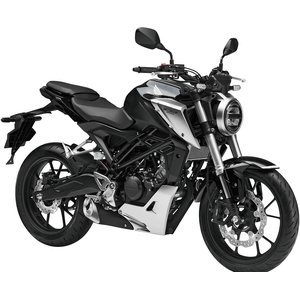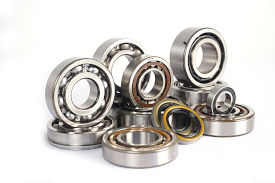Honda CB125R NEO [2018-2020] Review: The Pint-Sized Powerhouse That Defies Expectations
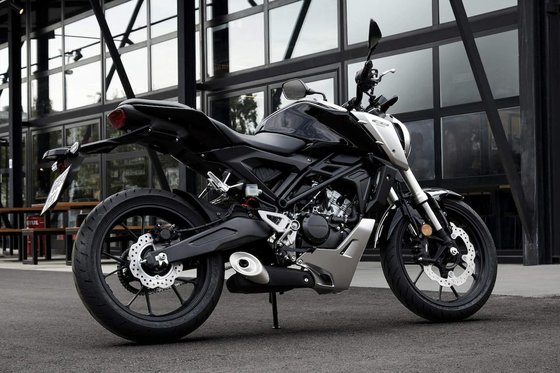
Introduction
The Honda CB125R NEO isn’t just another entry-level motorcycle—it’s a statement. Positioned as the baby sibling to Honda’s revered CB1000R, this 125cc machine punches far above its weight class with a design ethos that screams premium minimalism and engineering precision. Designed for urban warriors and new riders alike, the CB125R NEO blends approachable performance with head-turning aesthetics. But does it deliver on the promise of being a "miniature superbike"? Let’s throttle through the details.
Design & Aesthetics: Small Bike, Big Presence
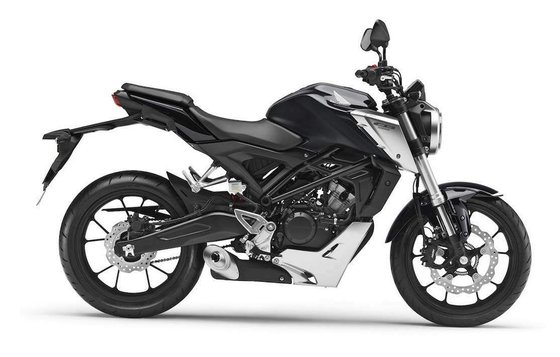
Honda’s Neo Sports Café design language shines here. The CB125R’s muscular tank, angular radiator shroud, and blacked-out engine give it a predatory stance that belies its 126 kg (277.7 lbs) curb weight. The split LED headlight—Honda’s thinnest ever—adds a futuristic touch, while the tucked-in sump guard and alloy accents keep the look cohesive.
The 816 mm (32.1 in) seat height is accessible for shorter riders, though taller pilots might find the compact ergonomics snug. The tapered aluminum handlebars and minimalist LCD dash (just 23.5 mm thick) reinforce the bike’s "less is more" philosophy. Practicality isn’t sacrificed either: the 10-liter (2.6-gallon) fuel tank offers a claimed 298-mile (480 km) range thanks to 136.7 mpg efficiency—a commuter’s dream.
Engine & Performance: The Joy of a Rev-Happy Single
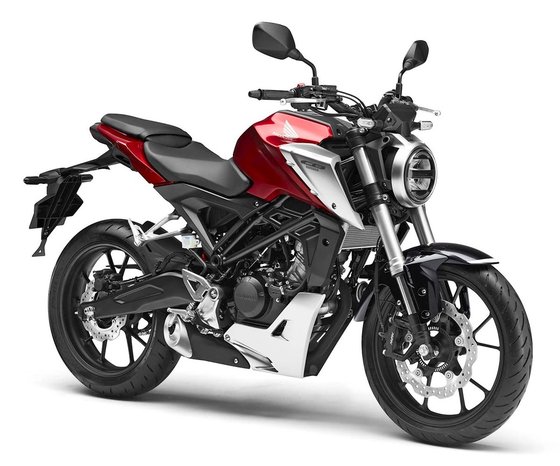
At its heart lies a liquid-cooled 124.7cc SOHC single-cylinder engine producing 13.1 hp @ 10,000 rpm and 10.2 Nm (7.3 lb-ft) @ 8,000 rpm. Numbers don’t tell the full story. Twist the throttle, and the CB125R rewards with eager low-to-midrange pull, its six-speed gearbox snicking through ratios with Honda’s trademark precision.
Real-World Riding Impressions:
- City Slicing: Below 60 km/h (37 mph), the engine thrives. The lightweight chassis darts through traffic, while the IMU-assisted ABS inspires confidence during sudden stops.
- Highway Limitations: At 90+ km/h (56 mph), vibrations creep in, reminding you this is still a 125cc machine. Yet, it holds its own better than most rivals.
- Soundtrack: The muted exhaust note lacks drama, but the mechanical whir of the single cylinder has a charming, industrial rhythm.
Handling & Dynamics: A Masterclass in Agility
The CB125R’s Inner Pivot Diamond Frame and 41mm USD forks (borrowed from larger bikes) deliver handling that’s borderline telepathic. With a 24.2° rake and 90 mm (3.5 in) trail, it carves corners like a scalpel. The 150/60 rear tire provides surprising grip, while the preload-adjustable rear shock absorbs bumps without wallowing.
Braking: The Nissin four-piston radial caliper biting a 296mm disc up front is overkill—in the best way. Stoppies are temptingly easy, though the IMU ensures ABS intervenes smoothly. The rear 220mm disc feels adequate but secondary.
Technology & Features: Premium Touches in a Budget Package
- Full LED Lighting: The headlight’s crisp cutoff and LED turn signals elevate the bike’s premium feel.
- LCD Instrument Cluster: Gear indicator, fuel gauge, and real-time fuel efficiency data are welcome additions.
- IMU-Based ABS: Rare in this segment, the system modulates braking force based on lean angle—a lifesaver for novice riders.
Competition: How Does the CB125R Stack Up?
Yamaha MT-125
- Pros: 15 hp, sharper styling, quicker acceleration.
- Cons: Firmer seat, higher weight (140 kg), less refined ABS.
Verdict: The MT-125 is sportier but sacrifices comfort and fuel efficiency.
KTM 125 Duke
- Pros: 15 hp, aggressive ergonomics, WP suspension.
- Cons: Harsh low-speed ride, polarizing design, higher maintenance costs.
Verdict: A track-ready hooligan vs. the CB125R’s urban sophistication.
Kawasaki Z125 Pro
- Pros: Lower price, retro charm.
- Cons: Air-cooled engine, 4-speed gearbox, no ABS.
Verdict: The Z125 feels dated next to Honda’s tech-forward approach.
Key Takeaway: The CB125R trades outright power for refinement and usability—a fair compromise for its target audience.
Maintenance: Keeping Your CB125R in Peak Condition
Critical Service Points:
- Oil Changes: Use SAE 10W-30 (1.0L with filter). Replace every 6,000 km (3,700 miles).
- Chain Care: The 134-link O-ring chain needs regular cleaning and lubrication. Upgrade to a DID X-Ring chain for longevity.
- Brake Fluid: Flush DOT 4 fluid every 2 years.
- Coolant: Replace 1.0L of ethylene glycol every 24,000 km (15,000 miles).
- Spark Plugs: NGK CR8E (standard) or CR8EIX iridium for colder climates.
Common Upgrades:
- Exhaust: A slip-on muffler shaves weight and amplifies the engine note.
- Ergonomics: Gel seat pads or bar risers improve long-day comfort.
- Tires: Swap to Michelin Pilot Street Radials for wet-weather confidence.
Conclusion: The 125cc Benchmark
The Honda CB125R NEO isn’t just a learner bike—it’s a gateway drug to motorcycling. Its combination of premium components, agile handling, and bulletproof reliability makes it a standout in the 125cc class. While power-hungry riders might crave more, the CB125R’s charm lies in its ability to make everyday rides feel special. Whether you’re threading through city traffic or hunting backroad curves, this pint-sized Honda proves that great things do come in small packages.
Ready to personalize your CB125R? Explore MOTOPARTS.store’s curated selection of upgrades tailored for this modern classic.
Specifications sheet
| Engine | |
|---|---|
| Stroke: | Four-stroke |
| Max power: | 10 kW | 13.0 hp |
| Max torque: | 10 Nm |
| Fuel system: | PGM-FI electronic fuel injection |
| Lubrication: | Wet sump |
| Max power @: | 10000 rpm |
| Displacement: | 125 ccm |
| Max torque @: | 8000 rpm |
| Configuration: | Single |
| Cooling system: | Liquid cooled |
| Compression ratio: | 11.0:1 |
| Number of cylinders: | 1 |
| Dimensions | |
|---|---|
| Wheelbase: | 1345 mm (52.9 in) |
| Wet weight: | 126 |
| Seat height: | 816 mm (32.1 in) |
| Overall width: | 820 mm (32.2 in) |
| Overall height: | 1055 mm (41.5 in) |
| Overall length: | 2015 mm (79.3 in) |
| Ground clearance: | 140 mm (5.5 in) |
| Fuel tank capacity: | 10 L (2.6 US gal) |
| Drivetrain | |
|---|---|
| Final drive: | chain |
| Chain length: | 134 |
| Transmission: | 6-speed, wet multiplate clutch |
| Rear sprocket: | 47 |
| Front sprocket: | 15 |
| Electrical | |
|---|---|
| Battery: | YTZ6V 12V 5Ah MF |
| Ignition: | Digital CDI |
| Lighting: | Full LED |
| Maintenance | |
|---|---|
| Rear tire: | 150/60-17 |
| Engine oil: | 10W30 |
| Front tire: | 110/70-17 |
| Brake fluid: | DOT 4 |
| Spark plugs: | NGK CR8E or NGK CR8EIX |
| Coolant capacity: | 1.0 |
| Engine oil capacity: | 1.0 |
| Engine oil change interval: | Every 5000 km or 12 months |
| Valve clearance (intake, cold): | 0.10–0.20 mm |
| Valve clearance check interval: | 24,000 km / 15,000 mi |
| Valve clearance (exhaust, cold): | 0.20–0.30 mm |
| Chassis and Suspension | |
|---|---|
| Rake: | 24.2° |
| Frame: | Tubular steel lattice (Inner Pivot Diamond Frame) |
| Trail: | 90 mm (3.5 in) |
| Rear brakes: | 220mm disc, 1-piston caliper (ABS with IMU) |
| Front brakes: | 296mm disc, 4-piston Nissin radial caliper (ABS with IMU) |
| Rear suspension: | Preload-adjustable monoshock |
| Front suspension: | 41mm USD telescopic fork |



